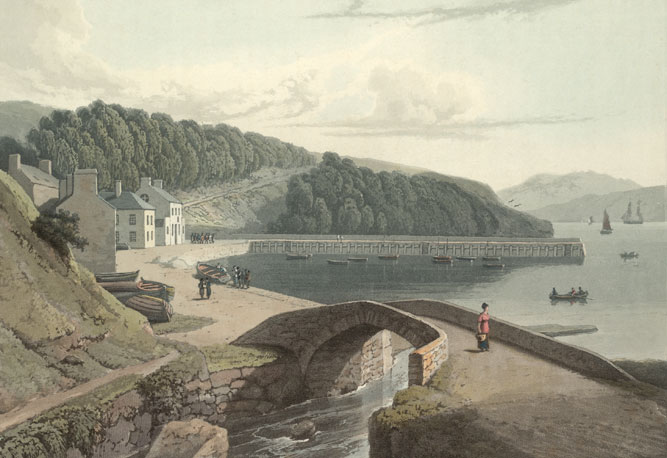DANIELL, William (1769-1837)
Tobermory, on the Sound of Mull

© National Library of Scotland.
William Daniell image supplied by the National Library of Scotland for use in the LEMA Project.
[Plate 44]
Tobermory
"The road along the coast northward from Aros to Tobermory commands a succession of very grand mountain scenery, rendered more effective by contiguity with the Sound of Mull. The view here given, entitled TOBERMORY ON THE SOUND OF MULL, represents that harbour as seen on the approach to it in this direction. It is well landlocked, and has a fine commodious pier of masonry, that affords good shelter for boats. The scene was, at the period of this visit, much enlivened by the presence of numerous vessels touching here on their voyage northward to engage in the herring fishery. This village being peculiarly well situated for that branch of trade, attracted the notice of the British Society for the encouragement of Fisheries, to whose exertions it is in a great degree indebted for its present prosperity and rising importance. It possesses a fine bay, protected from the ocean by the small Isle of Calve, and it lies directly in the track of shipping which pass from the western parts of Britain to the northern countries of Europe. It has also the advantage of an easy navigable communication with the fishing lochs in one direction, and with the Firth of Clyde, as well as with Liverpool and many considerable ports in the other. These advantages it possesses, according to the opinion of many persons, in a degree superior to those ascribed to the port of Oban, though individuals interested in the prosperity of that establishment will naturally be inclined to call this superiority in question. The society above mentioned commenced their improvements at Tobermory in 1788: a custom-house and post-office were established here in 1791. Since that period its trade has been progressive, and it has obtained a proportional increase of population. Although still so limited in extent as to be properly termed a village, it is divided into an upper and a lower town, the latter of which, being most conveniently situated for commerce, will probably thrive the most rapidly, and reduce the other to a mere suburb. The inhabitants of Tobermory, whether from the frequent intercourse with strangers which their situation occasions, or from other causes, are distinguished from other Hebrideans by a greater attention to personal neatness and cleanliness. Their reputation for these qualities was spoken of at various places in the course of the voyage; and, on arriving among them, it proved to be well founded. Another agreeable prepossession which a traveller acquires in journeying thither arises from the frequent praise bestowed on the beauty of its females, and this characteristic also is well warranted. There are certainly many pretty women at Tobermory, and their appearance, as well as that of the children and the men, is much improved, by that glow of health which habitual cleanliness never fails to promote. It has also been remarked, and with truth, that the language spoken at this port is more purely English, and is less deformed by provincialisms, either of phraseology or of accent, than at many other remote towns in the west of Scotland. This purity of idiom may have been generated by the example of some of the first settlers; but it has no doubt been maintained and extended by those frequent communications with strangers which the rising commerce of the place has rendered necessary. These are all very gratifying and cheering symptoms of the future prosperity of this little colony, and afford a hope that their influence will be beneficially felt among the neighbouring establishments connected with it. felt among the neighbouring establishments connected with it. One little remark, however, requires to be made, by way of qualifying this commendation: the traveller who visits Tobermory must not form his judgment of its comforts and its proprete by the style of accommodation which he meets with at the principal inn. He will there have to tolerate a good deal of negligence on the part of the attendants, and may expect to take his soup with a horn spoon instead of a silver one. The interminable series of petty inconveniences to which this belongs may be left to the imagination; it seemed fair to hint at them, because, when they are anticipated, they may be more good-humouredly endured. In such a case, to be forewarned is to be forearmed.
There are some trees on the slope of the hills near Tobermory, as represented in the view; this, perhaps, is the wood which the learned tourist mistook for heath. The prospect from these elevated grounds is very extensive; every vessel passing up or down the Sound of Mull may here be observed. The mountains seen in the distance are those which overlook the shores of Loch Sunart. The bridge represented in the foreground traverses a little rapid mountain stream which flows into the bay of Tobermory. The road over the bridge is that which leads from Aros."
Source: Extract from DANIELL, William. A Voyage Round Great Britain [1813-1823].
Back to Scotland: Gallery





